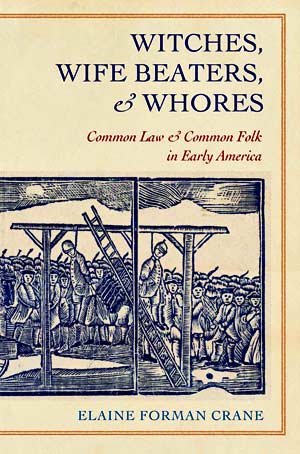
Witches, Wife Beaters, and Whores combines people, history, and law. The book is composed of six stories about early Americans and how brushes with the law affected everyday life.
If the chapters are not exactly “ripped from the headlines,” they do focus on attention-grabbing criminal or civil conflicts and the way ordinary people stumbled through complicated legal tangles. We may not be able to hear their voices, but their actions are familiar. Indeed, they are remarkably like us.
The chapters range geographically from New England to New Amsterdam and from Maryland to Bermuda. Men and women, free and enslaved, humans and spirits rub elbows throughout the pages as the seventeenth and eighteenth centuries collide with the early nineteenth. Although social issues dominate the story lines, sex and money are integral to the narratives.
The first chapter explores slander in New Amsterdam and the creative use of scurrilous language by Dutch settlers. The word “whore” may allude to illicit sexuality in modern parlance, but in New Amsterdam it was a slur directed at unscrupulous women in the marketplace.
In chapter two, male and female witches command attention by instilling fear and generating havoc in Bermuda, while sexual overtones contribute to the accusations against them. Despite their best efforts, however, even the devil’s minions eventually succumb to the rule of law.
Domestic violence is the subject of chapter three, a narrative that analyzes the way abused women surrounded themselves with friends and neighbors as a protection against brutal husbands.
The plot of chapter four involves attempted rape, as an enslaved ferry captain defends himself in court against charges brought by an elite but, perhaps, conniving woman. The outcome of the case depends on whether the reader believes what “he said” rather than what “she said,” with only a Rashomon ending to fall back on.
The desperate financial travails of Samuel Banister serve as background to a murder story in chapter five, while chapter six demonstrates how the testimony of a ghost could determine the outcome of a trial and influence bastardy proceedings, property ownership, and national politics.
What also ties the chapters together and makes a coherent narrative of six disparate stories is the widespread knowledge of and reliance on legal principles that had stood the test of time in the Dutch and Anglo-American worlds. In all of the chapters, the actors display an amazing grasp of law and an astonishing comprehension of their “rights.”
Given the proliferation of criminal and legal cases and the amount of time that early Americans spent in the courtroom, their knowledge of things legal should not have come as a surprise—but it does. And it is fortunate that this thread weaves through the chapters, because without it Witches, Wife Beaters, and Whores would have been a book in search of a thesis.
In other words, each of these cases was a serendipitous find rather than the result of a deliberate search for specific material. The absorbing cases related in this book drew my attention unexpectedly at different times as I researched a previous one—Killed Strangely: The Death of Rebecca Cornell. Because they captured my interest, I put them aside for some future, undetermined use. It was only when I noticed how often legal principles were intertwined with daily life and how consistently legal savvy permeated each case that I decided to link them together in a book that gives people and law central billing.
The question that remains unanswered is how did early Americans—especially those who were not literate—become aware of what the law demanded of them? How did they know what personal rights they commanded under civil and common law? Comfort Taylor knew she should scream, report the alleged assault immediately, and exhibit her bruises in order to make a credible case. Where did she learn this?
Over the years I have given considerable thought to the way history is written and why readers become more easily immersed in fiction as opposed to non-fiction. It seems to me that the narrative form, concentration on one or only a few protagonists (as well as dialogue between them) enhances readability in ways that a bland historical analysis often reduces. Thus, I have come to believe that history is best told as a story, or in the case of Witches, Wife Beaters, and Whores, as a series of stories.
Historians have given a name to this approach: microhistory. Microhistory looks intensely at a moment in time and concentrates on the people directly involved in an incident or episode. It investigates the same event from different angles, revealing the rich complexities and conundrums that more general studies overlook or ignore. Legal documents that offer witnesses, victims, plaintiffs and defendants opportunities to speak for themselves as well as to us are a wonderful basis from which to construct microhistorical accounts. Historians are, after all, storytellers—griots with computers.
Having sorted this out in my own mind, I admit that I play favorites with the various chapters.
If the name-calling Dutch in chapter one are the most amusing characters, and the violent abusers in chapter three the most disturbing, the most captivating stories are those where we revel in the intimate details of people’s lives.
Thus, even though I remain ambivalent about whether Cuff actually attempted to rape Comfort Taylor, the details of the case allow us to envision not only what-might-have-been but to appreciate the nuances of life in eighteenth-century Newport, Rhode Island.
The opening pages remind us of a slower time when water and horseback were the basic modes of transportation. Meeting the young widowed Comfort for the first time we wonder if women usually traveled alone across long distances and whether she had any misgivings boarding the ferry late in the day with only an enslaved ferry captain for company. As darkness enveloped Narragansett Bay, men on shore heard her shout for help and rushed to her rescue. Back at the ferry house, Comfort showed her bruises and claimed Cuff assaulted her. Cuff denied everything, and his owner, Thomas Borden, offered Comfort compensation to make the incident go away. Comfort chose to sue Cuff, and the jury’s verdict along with subsequent events shows how microhistorical narratives have the ability to nuance and complicate stories. In this case, the nuances leave us wondering whether Comfort was a victim or a scheming predator, and the fact that Cuff—a slave—was afforded all the legal rights of a free white male complicates the subject of slavery. The ending? Surprises to be sure, but ones not to be revealed here.
Early settlers created a legal culture that crossed boundaries and time. Shared values, embedded in traditions that migrated across the Atlantic and adapted to conditions on the North American continent, stabilized communities and unified immigrants. This evolving legal culture peaceably Americanized those within its reach—yet, paradoxically, within a context of conflict. Nevertheless, the disputes that brought individuals into the courtroom were generally restrained by the formalities of that venue.
Moreover, if legal contests were eventually fought in legal arenas, it is nothing less than remarkable how often such matters were initiated by ordinary people going about their business on an ordinary day. Samuel Banister fell behind in his rent, the sheriff came to evict him and Banister declined to leave the house. Instead, he shot and killed the sheriff’s assistant, a man Banister only meant to threaten. The implications of property ownership, debtor laws, tenant rights, and live-in servants all contributed to this tragic story.
The legal aspects of the tale may recede to the background in the interest of good storytelling, but they are integral to the narrative nonetheless. So too are the unknown players who move the story forward. By bringing them to the foreground, Witches, Wife Beaters, and Whores addresses the role of common folk in early America.
Those debtors, tenants, and servants played as much of a part in the creation of a legal culture as did the legislators who wrote the laws. By obeying such laws, common folk legitimized the authority of those above them. By circumventing the system and seeking justice or punishment through private negotiations, common folk created common law. I suspect they appreciated the empowerment that the legal process offered, even if they were unaware of how it came to be or that they would be the vehicles by which the rule of law would be Americanized and perpetuated.


Elaine Forman Crane is Professor of History and American Studies at Fordham University in New York. She teaches courses about early America with emphasis on gender and legal history. In addition to Witches, Wife Beaters and Whores: Common Law and Common Folk in Early America, featured on Rorotoko, she is the author of several other books, including Killed Strangely: the Death of Rebecca Cornell, a study of the only matricide case in colonial America.